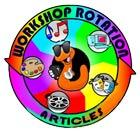Originally posted by Neil MacQueen in 2006 and moved here as a short article. I'm occasionally asked, "Where are the "GRADED" Rotation Lesson Plans?"
I'm occasionally asked, "Where are the "GRADED" Rotation Lesson Plans?"
The question reveals old habits, old thinking, and how dependent churches became on whatever the publishers were saying and selling.
Do we really need different lesson plans for 3rd and 4th graders? No. For all practical purposes, 3rd and 4th graders are the same when it comes to Bible stories. When you're teaching math and grammar, you DO need to have different grade level goals for 3rd and 4th grade. But what's the difference between a 3rd and 4th grader when teaching the Prodigal Son? Answer: ZERO.
You only need different lesson plans if you're teaching DIFFERENT stories to those two ages. And the Rotation Model says, "teach all your elementary kids the same story."
At one former church of mine, we spent over $800 a year on graded curriculum. If I were a publisher, I'd LOVE to sell you one set of lesson plans for 1st grade, and another for 2nd grade, and another for 3rd, and so on. But in Rotation, we adapt the same lesson plan each week to our student's needs.
Fact is, most churches have broadly-graded classes because most churches are small. This is another reason we 'rotate' ...so that these important stories are taught through different teachers and media over many weeks, ...just in case one week the teacher or kid don't quite connect.
A simple truth:
The less "talk-centered" the lesson plan, and the more active the kids are exploring the story, the better the material tends to adjust up and down the age range.
For the practical purposes of Sunday School curriculum, there are only really THREE DEVELOPMENTAL LEVELS that Rotation Model enthusiasts pay attention to:
1. Non-readers (K's and 1st grade)
2. Young readers (typically grades 2 and 3)
3. Older Elementary (grades 4-6)
After that, the big differences in our kids involve their behavior and spiritual depth. Which is to say, some 4th graders are more spiritually mature than some 5th graders, and some of our regular attenders are better students than our irregular ones.
THE 4TH GRADE SWEETSPOT FOR LESSONS
Very early on in the development of the Rotation Model, we as PARENTS and teachers recognized that MOST "older kid" lessons could easily be adapted "down" to younger children. We just needed to simplify the vocabulary, change the reading approach, and adjust the activity to make a 4th grade lesson work for a 2nd grader.
As a matter of fact, adapting down came quite naturally to parents and teachers. And to those to whom it didn't, we just needed to write them some notes. No need to buy graded curriculum for that!
Conversely, we recognized that it was harder to start with a young lesson and adapt it "up" to our older kids.
THIS MEANS that in the Rotation Model we tend to WRITE FOR OUR 4th graders.
K's and 1st are a bit more of a stretch, and that's why you frequently see "YOUNGER AGE ADAPTATIONS" written into Rotation lesson plans, especially those of the Writing Team.
Your age adjustments may vary by workshop.
ART Bible lessons tend to be easy to adjust up and down. But DRAMA and COMPUTER do better with older children because of the need to read and manual dexterity with some software.
In the VIDEO Workshop, we often pick one video for younger, and another for older. Depends on the video!
PUPPETS often have a "younger" feel to them, so some Rotation churches don't use it with their older kids, substituting Drama instead. Other Rotation churches do more sophisticated puppeteering. God Bless the Cooking Workshop and Game Workshops, they seems to have the easiest time adjusting to a wide age range, and only need some conceptual and vocabulary adjustments.
Scheduling adjustments often help ages "adjust" to your lessons!
It's common in Rotation Model to put the younger children in the VIDEO workshop in the first week of the rotation where they can get "the whole story first." For a similar reason I like to put my older kids in the COMPUTER workshop in the first week, because they need less instruction how to manage through software, and they will help the teacher get comfortable in that first week.
My biggest "age adjusting" tip to lesson writers is this:
Write out TWO VERSIONS of your discussion and reflection questions for your TEACHERS that adjust the LANGUAGE for older and younger grades.
Now, I honestly do not write out two different sets for myself. But some teachers need that kind of help.
I hope this brief explanation helps you write and teach great Rotation Bible lessons.
Your thoughts are welcome.
<>< Neil


